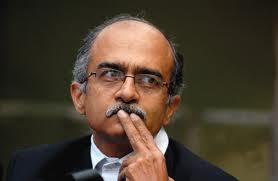New Delhi, Dec 10: Even as the stalemate over government formation continues in Delhi, Aam Aadmi Party leader Prashant Bhushan has said his party may consider extending issue-based support to the BJP, which has emerged as the single largest party with 31 seats in the 70-member Assembly.
In an interview to NDTV, Mr. Bhushan said: “If the BJP gives us in writing that it will pass the Jan Lokpal Bill by December 29 and set up ‘Jan Sabhas’ (public assemblies) in Delhi, as promised by the Aam Aadmi Party, we may consider supporting the party.”
But he said it was his view and not that of his party, which stands second with 28 seats. “It’s my view and it has not been discussed within the party.”
This is the first time an AAP leader has talked about extending limited support to the BJP since the results of the Assembly elections were declared on Sunday. Both the BJP and the AAP have been reluctant to form a government so far, citing lack of numbers.
In fact, till Monday evening, AAP leader Yogendra Yadav had maintained that his party would not form a government; it would instead sit in the Opposition.
Even at a meeting of AAP winners in the evening, party convener Arvind Kejriwal ruled out support to both the BJP and the Congress, and said the AAP would not stake claim to form a government.
A day after the Assembly elections to the Delhi Assembly threw up a hung verdict, Lieutenant-Governor Najeeb Jung was reviewing the developments, according to informed sources in his office.
Sources in the Home Ministry said the Lt-Governor was likely to call the single largest party, the BJP, which along with its partner Akali Dal’s one seat, has 32 MLAs, to ascertain if it was ready to form a government. In the event of the BJP declining to form the government, the Lt-Governor may explore the option of asking the AAP if it will be in a position to do so.
Both the BJP and the AAP have asserted they are not inclined to stake claim. After exhausting all options, the Lt-Governor would submit a report to the Home Ministry recommending the future course of action, which could be imposition of President’s Rule and keeping the Assembly in suspended animation.
The political affairs committee of the AAP met at Arvind Kejriwal’s residence to consider the party’s future course of action. Emerging from the meeting, AAP leader Yogendra Yadav said that even if the Lt-Governor invited the party to form government it would decline the offer, citing lack of majority.
“We’ve stated right from the beginning that we will not seek or offer support to the Congress or the BJP. There is nothing in the results which can change our stand. The result is the moral and political victory of our party, but we don’t have the numbers... We are also not the single largest party. I don’t know why the onus of forming the government is being shifted on us,” said Mr. Yadav.





Comments
Add new comment